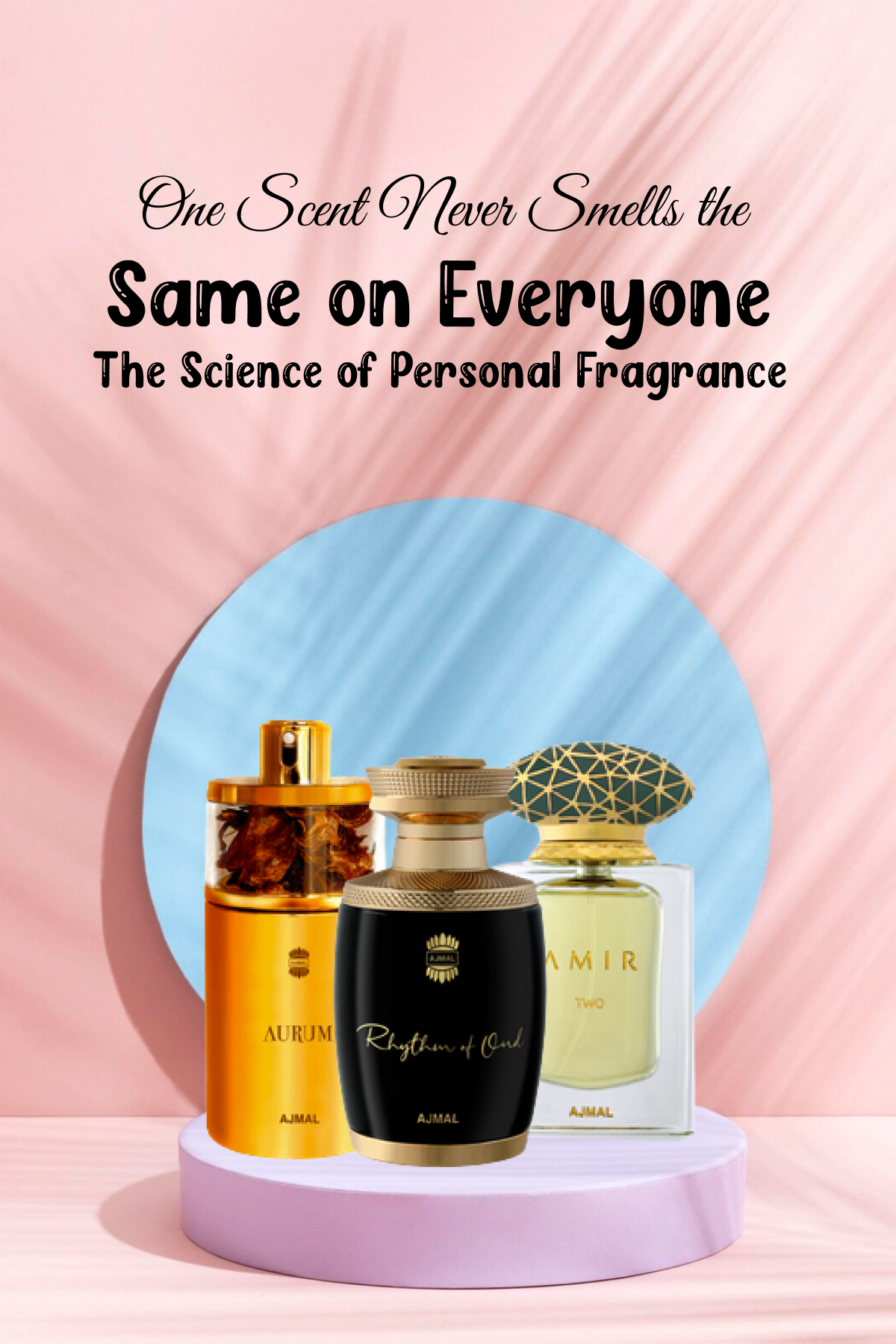Have you ever noticed how a perfume that smells great on a buddy smells quite different on you? This phenomenon, in which the same fragrance smells different on various persons, is rather prevalent. But why is this happening? The explanation lies in our bodies’ unique chemistry and the complex science of fragrance.
The Role of Body Chemistry.
1. Skin Type
The type of skin you have influences how a fragrance develops on your skin. Oily skin retains scents longer and can make fragrances smell stronger. In contrast, dry skin may not keep odors as well, leading them to fade more rapidly and smell lighter.
2. pH Level
The pH level of your skin, which determines whether it is acidic or alkaline, can influence how a scent smells. Each person’s skin has a unique pH level, which reacts with the perfume’s chemicals to produce different scents.
3. Body Temperature
Your body temperature might influence how a smell changes throughout the day. Warmer body temperatures can increase the intensity of the perfume, but cooler temperatures may produce a softer aroma.
Personal Biology and Lifestyle.
1. Diet:
What you eat affects your body odor and how fragrances smell on you. Spicy foods, garlic, and other strong-smelling foods can permeate your pores and change the aroma of your perfume.
2. Hormones
Hormonal changes, whether caused by stress, menstrual cycles, or other circumstances, might alter your natural smell. This, in turn, affects how a perfume smells on your skin.
3: Medication
ertain drugs might alter your body’s chemistry, influencing how fragrances, such as chypre palatin perfume, interact with your skin. If you’ve noticed a difference in the way your favorite perfume smells, you should evaluate whether any new medications are influencing this.
Environmental Factors:
1. Climate
The climate you reside in can also influence how a fragrance behaves. Scents are more noticeable in humid regions, but they may be less intense in dry areas.
2: Pollution and Environment
Environmental contaminants and even the textiles you wear can interact with your perfume, changing its aroma. Synthetic clothes, for example, can trap odors differently than natural fibers such as cotton or wool.
Composition of Fragrance
1: Top, Middle, and Base Notes
Fragrances consist of top, middle, and base notes. The top notes are what you smell immediately after applying the perfume, the middle notes appear shortly after, and the base notes leave a lasting impression. The way these notes interact with your skin can vary, causing the same perfume to smell differently as it passes through these stages on various people.
2. Perfume Ingredients
The precise components in a perfume may react differently with your skin chemistry. Natural oils, synthetic substances, and the concentration of these components all influence how a scent smells on you.
Tips for Selecting the Right Perfume.
1: Test Before You Buy
Always test perfumes on your skin before purchasing. Allow it to grow for a few hours and see how it smells. This will offer you a better understanding of how the fragrance reacts with your individual chemistry.
2. Consider Your Skin Type
If you have dry skin, you may benefit from using a matching scented lotion or an unscented moisturizer before spraying your perfume to extend the fragrance.
3. Be aware of changes
Changes in food, medication, or lifestyle can all have an impact on the way your perfume smells. Don’t be surprised if a fragrance you loved in the past no longer smells the same.
Have you ever met a wonderful fragrance only to discover that it is a scent you already love but smells virtually unrecognizable? This occurs because perfume interacts differently with each individual’s body, resulting in a distinct scent. Your skin’s pH balance, which determines how acidic or alkaline it is, has a huge impact on how perfume compounds develop.
Each person’s pH is somewhat different, which influences how the fragrance develops. Furthermore, the type of skin you have is important; oily skin can hold perfume longer and amplify the scent, whilst dry skin may cause the fragrance to disperse faster, making it smell lighter. This is particularly relevant for oriental chypre perfumes, which often have rich and complex notes that can be affected by individual skin chemistry.
Hormone levels also play a role in this fluctuation, as hormones fluctuate owing to stress, menstrual cycles, and other physiological changes, impacting your natural body odor and, as a result, how perfume smells on you. Your diet can also influence this relationship; eating spicy foods, garlic, and other strong-smelling foods can soak into your pores and change the aroma of your perfume.
All of these elements together mean that a perfume that smells fantastic on your closest friend may not have the same effect on you, as your individual body chemistry alters the fragrance in its own unique way.
Conclusion:
The science of fragrance is both complex and interesting. While it may be upsetting that a favorite fragrance does not smell the same on everyone, it is precisely this uniqueness that draws people into the world of perfume. Accept your scent’s uniqueness and enjoy the process of selecting the appropriate perfume to compliment your individual chemistry.














